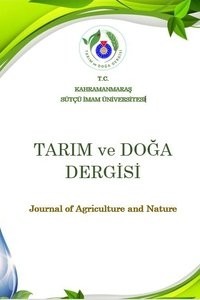Echinops phaeocephalus (Asteraceae) Türünün Antimikrobiyal ve Antioksidan Aktivitesi
fenolik içerik, Compositae, flavanoid, antibakterial, antifungal
Antimicrobial and Antioxidant Activity of Echinops phaeocephalus (Asteraceae)
Compositae, phenolic content, flavonoid, antibacterial, antifungal,
___
- Chang CC, Yang MH, Wen HM, Chern JC 2002. Estimation of Total Flavonoid Content in Propolis by Two Complementary Colorimetric Methods. Journal of Food and Drug Analysis, 10(3): 178-182.
- Dawit A, Ahadu A 1993. Medicinal Plantsand Enigmatic Health Practicesof Northern Ethiopia, Birhanena Selam, Addis Ababa, Ethopia 37–44.
- Gamez-Meza N, Noriega-Rodriguez JA, Medina-Juarez LA, Ortega-Garcia J, Cazarez-Casanova R, Angulo-Guerrero O 1999. Antioxidant activity in soybean oil of extracts from Thompson grape bagasse. Journal of the American Oil Chemists Society, 76: 1445-1447.
- Haslam E 1996. Natural polyphenols (vegetable tannins) as drugs: possible modes of action. Journal of Natural Products, 59: 205-15.
- Hymete A, Iversen TH, Rohloff J, Erko B 2005. Screening of Echinops ellenbeckii and Echinops longisetus for Biological Activities and Chemical Constituents. Phytomedicine 12: 675-679.
- NCCLS (National Committee for Clinical Laboratory Standards) 1999. In Performance standards for antimicrobial susceptibility testing: 9th information supplement. Document M100-S9, Wayne, PA, USA.
- NCCLS (National Committee for Clinical Laboratory Standards) 1997. Performance Standards for Antimicrobial Disk Susceptibility Tests: Approved Standard Enclose -A 7. Wayne, PA,USA.
- Nissen N, Evans S 2012. Exploring the practice and use of Western herbal medicine: Perspectives from the social science literature. Journal of Herbal Medicine, 2: 6-15.
- Singh RP, Pandey VB 1994. Further flavonoids of Echinops niveus. Fitoterapia, 65(4): 374.
- Tadesse, M, Abegaz B 1990. A review of the Genus Echinops (Composite, Craude) in Ethiopia with Notes on Phytogeography and Chemistry. Proceedings of the 12th Plenary Meeting of AETFAT, 4-10 September, Hamburg.
- Başlangıç: 1997
- Yayıncı: Kahramanmaraş Sütçü İmam Üniv.
Sivas İli Heterocera (Lepidoptera) Faunasına Katkılar
Mehmet ARSLAN, Nurcan ERBİL, Taygun TİMOÇİN, Rima ÇELİK, Mehmet Tahir HÜSUNET, Hasan Basri İLA
Aşağı Seyhan Ovası Sulama Birliklerinin Kümeleme Analizi İle Karşılaştırılması
Hasan DEĞİRMENCİ, Çağatay TANRIVERDİ, Fırat ARSLAN
Sosyal Medyanın Tüketicilerin Gıda Ürünleri Satın Alma Davranışına Etkisi
Primula vulgaris Yaprak Ekstraktının Antioksidan ve Sitotoksik Özelliklerinin Değerlendirilmesi
Selim DEMİR, İbrahim TURAN, Rezzan ALİYAZICIOĞLU, Yüksel ALİYAZICIOĞLU
Echinops phaeocephalus (Asteraceae) Türünün Antimikrobiyal ve Antioksidan Aktivitesi
Kahramanmaraş İli Bombus Arı Türleri ve Bulundukları Bitki Örtüsünün Belirlenmesi
Mahmut Murat ASLAN, Ceyda ÜCÜK, Gülser CANDAN
Saros Körfezi Gorgon (Anthozoa, Octocorallia, Holaxonia) Topluluklarının Demografik Yapıları
Doğu Akdeniz Bölgesinde Bulunan Sulak Alanlarda Oluşan Toprakların Kil Minerali Özellikleri
Ahu Alev ABACI BAYAN, Kadir YILMAZ
Türkiye Orjinli Yulaf Genotiplerinin Basit Dizi Tekrarları (SSR) Markörleriyle Karakterizasyonu
Ali TEKİN, Erdem ASLAN, Sevgi HEREK, Tevrican DOKUYUCU, Hasan GEZGİNÇ, Halil TEKEREK, Ziya DUMLUPINAR, Aydın AKKAYA
